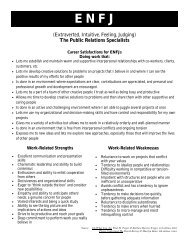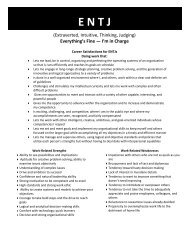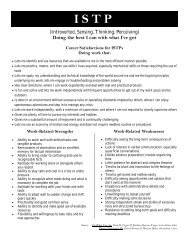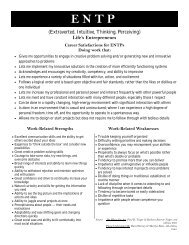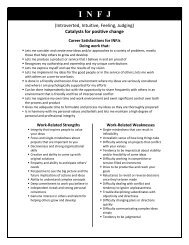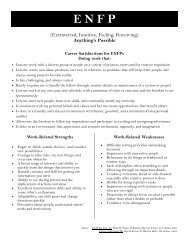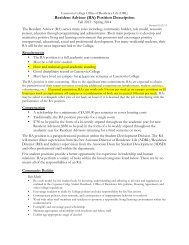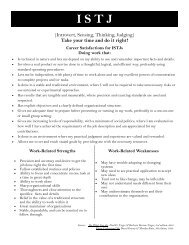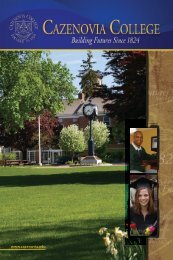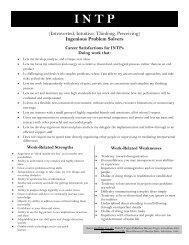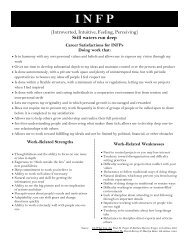of
2013-14 Academic Catalog - Cazenovia College
2013-14 Academic Catalog - Cazenovia College
- No tags were found...
You also want an ePaper? Increase the reach of your titles
YUMPU automatically turns print PDFs into web optimized ePapers that Google loves.
CJ 251 Corrections and Alternatives<br />
3 credits (CS)<br />
This course introduces students to issues and practices <strong>of</strong> a<br />
modern corrections system. Students will examine the<br />
historical development <strong>of</strong> the current system as well as the<br />
role <strong>of</strong> corrections, parole and probation, in our society.<br />
Students will also explore the methods <strong>of</strong> corrections<br />
management, current corrections practices, and alternatives,<br />
such as house arrest, electronic monitoring, day treatment,<br />
boot camps and drug courts, and the importance <strong>of</strong><br />
community corrections. Prerequisite: CJ 151 Introduction to<br />
Criminal Justice Functions and Processes, or permission <strong>of</strong><br />
the instructor<br />
CJ 252 Crime Scene Investigation<br />
3 credits (CS)<br />
An overview <strong>of</strong> approaches to detecting and resolving crimes<br />
through the discovery, collection, and preservation <strong>of</strong><br />
physical evidence. This course will provide students with a<br />
mixture <strong>of</strong> theoretical and hands-onǁ‖ instruction in<br />
approaches to and techniques used by the criminal<br />
investigator at the crime scene. A crime scene kit fee will be<br />
charged. (Offered alternate years). Prerequisite: CJ 151<br />
Introduction to Criminal Justice Functions and Processes, or<br />
permission <strong>of</strong> the instructor<br />
CJ 253 Criminal Law and Procedure<br />
3 credits (CS)<br />
This course will examine the bodies <strong>of</strong> law that provide<br />
definitions <strong>of</strong> crimes, and procedures for dealing with them.<br />
An examination <strong>of</strong> rights <strong>of</strong> the accused will also be explored.<br />
Prerequisite: CJ 151 Introduction to Criminal Justice<br />
Functions and Processes, or permission <strong>of</strong> the instructor<br />
CJ 255 Terrorism and<br />
Homeland Security<br />
3 credits (CS)<br />
This course explores the nature <strong>of</strong> terrorism and the United<br />
States’ response to it, in particular, the creation <strong>of</strong> the<br />
Department <strong>of</strong> Homeland Security, the CONPLAN,<br />
Presidential Directives and Executive Orders, the Patriot Act,<br />
RICO, and other federal and state laws. Prerequisite: CJ 151<br />
Introduction to Criminal Justice Functions and Processes, or<br />
permission <strong>of</strong> the instructor<br />
Prerequisite: SA 161 Photography I<br />
CJ 351 Criminal Justice Process<br />
3 credits (CS)<br />
This course provides a study <strong>of</strong> criminal investigation and<br />
police practices within the context <strong>of</strong> the Fourth Amendment<br />
to the United States Constitution by analyzing the legal,<br />
social, and historical foundations <strong>of</strong> landmark cases. The<br />
course will examine the balance between an individual’s<br />
expectation <strong>of</strong> privacy and the government’s ability to<br />
conduct searches and make seizures. The Fifth and Sixth<br />
Amendments will also be examined. Prerequisite: CJ 151<br />
Introduction to Criminal Justice Functions and Processes, CJ<br />
253 Criminal Law and Procedure, or permission <strong>of</strong> the<br />
instructor<br />
CJ 354 Policing in America<br />
3 credits (CS)<br />
This course examines police as part <strong>of</strong> society’s <strong>of</strong>ficial<br />
control apparatus. Major topics include historical<br />
development <strong>of</strong> the police, role <strong>of</strong> the police in the criminal<br />
justice system, functions and effectiveness <strong>of</strong> the police,<br />
police corruption, police ethics, civil liability issues, and the<br />
relationship <strong>of</strong> the police with the communities they serve.<br />
The changing face <strong>of</strong> policingǁ‖ and the future <strong>of</strong> policing in<br />
America will be explored. The course will also examine the<br />
nature and role <strong>of</strong> law enforcement first-responders to<br />
terrorist attacks or events involving use <strong>of</strong> weapons <strong>of</strong> mass<br />
destruction. Prerequisite: CJ 151 Introduction to Criminal<br />
Justice Functions and Processes, or permission <strong>of</strong> the<br />
instructor<br />
CJ 357 Constitutional Law<br />
3 credits (CS)<br />
This course explores the cherished rights <strong>of</strong> free speech,<br />
freedom <strong>of</strong> the press, and freedom <strong>of</strong> religion as provided in<br />
the First Amendment to the United States Constitution, by<br />
analyzing the legal and historical foundations <strong>of</strong> landmark<br />
cases. The course will delve into such topics as internal<br />
security, racist speech, anti-abortion demonstrations, and<br />
pornography. Prerequisite: CJ 151 Introduction to Criminal<br />
Justice Functions and Processes, HG 121 U.S. History to<br />
1877, or HG 122 U.S. History 1877 to present, or permission<br />
<strong>of</strong> instructor<br />
CJ 298 Criminal Justice Internship I<br />
3 credits (CS)<br />
The purpose <strong>of</strong> this course is to provide students with the<br />
opportunity to assess their interest and apply their classroom<br />
knowledge in a supervised internship experience in an area <strong>of</strong><br />
criminal justice. Prerequisites: Permission <strong>of</strong> instructor only<br />
CJ 330 Forensic Photography<br />
3 credits (CS)<br />
This course examines the theory and techniques <strong>of</strong> forensic<br />
photography as a tool to aid in crime scene investigations,<br />
surveillance techniques, and presentation <strong>of</strong> photographic<br />
and imaging pro<strong>of</strong> at trial. The methodologies used to teach<br />
this course include lectures, laboratory work, PowerPoint<br />
presentations, videotapes, case studies, and class discussions.<br />
CJ 358 Ethical Issues in Criminal Justice and Homeland<br />
Security<br />
3 credits (CS)<br />
This course is designed to identify and examine ethical issues<br />
in the criminal justice and homeland security fields. Such<br />
issues may include law enforcement discretionary power to<br />
arrest; when to use deadly force; when to engage in plea<br />
bargaining; when to accept and when to decline<br />
representation <strong>of</strong> defendants in criminal trials; perjury and<br />
destruction <strong>of</strong> evidence; prosecutorial discretion in the<br />
indictment process; the clash between security and personal<br />
liberty, such as warrantless wiretaps; and pr<strong>of</strong>iling at airports.<br />
Prerequisite: CJ 151 Introduction to Criminal Justice<br />
Functions and Processes, or permission <strong>of</strong> the instructor<br />
Academic Catalog | Cazenovia College | www.cazenovia.edu 144



